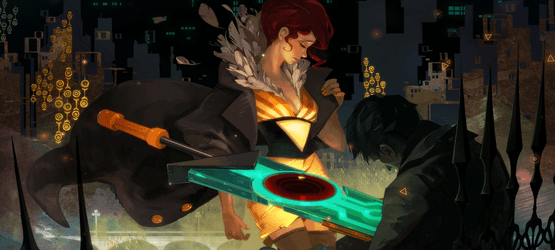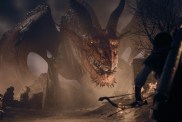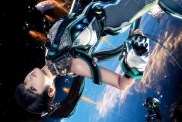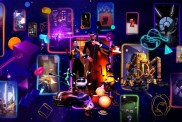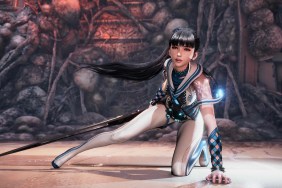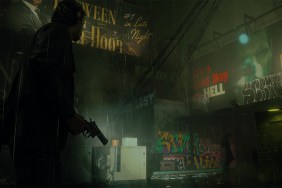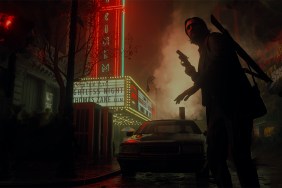After a stunning reveal at last year’s E3, Supergiant Games’ Transistor released today to glowing reviews praising the art, music, and overall beauty and originality of the game. When discussing the creative elements in Transistor, there is no better person to to talk to than Supergiant Games’ Creative Director Greg Kasavin. Despite his busy schedule surrounding the release, he graciously took some time to answer a few of our questions about the art, music, and story in Supergiant Games’ PS4 debut.
Hi Greg, as the Creative Director for Supergiant Games, what role did you play in Transistor’s development?
On Transistor I did all the writing and audio integration, and built and scripted roughly half of the levels in the game, among other things. We’re a small team of 12 so everyone has a lot of responsibilities.
The battle system in Transistor seems very unique, mixing real-time with turn-based elements. What inspired the battle system and how does it help to tell the story?
We were really interested in seeing if we could capture the drama and suspense of classic turn-based games and tactical RPGs in with the immediacy of the action RPG genre. We liked the idea of a game in which you could dictate the flow of the battle. We started thinking about wrapping all these systems into some sort of all-powerful weapon, which coincided with the kind of narrative we were interested in creating for this game.
One of the most prominent characters is left without much in the way of back story or details. What do you feel this mystery achieves for the story you have to tell?
The story revolves around the relationship between Red and the voice coming from the Transistor. Hopefully it is clear early on that the speaking character cares a lot about Red and wants to make sure she gets through the situation she’s in. While this character has a specific perspective and identity as far as we’re concerned, certain aspects of his identity are not specifically revealed, partly so that there is some latitude for players to consider who this character really is and what he’s really like. This felt important to achieve the together-but-separate status of the two principal characters.
A lot of confidence seems to be placed in Transistor’s beautiful soundtrack, with the OST releasing alongside the game. What was the collaboration like with composer Darren Korb during the story writing and development process?
We knew the music was going to be a big part of this game from the get-go, as we felt it could help define both the atmosphere of the setting but also the identity of the protagonist. Darren was involved in the project from the start and it’s only through that type of collaboration that we could get at a soundtrack that I think is as closely connected to the game experience as this one is. When it came to the song-writing portion, we would often talk at length about the substance of what’s going into these songs, so that Darren could approach them from Red’s own point of view. Besides doing the music and audio for the game, Darren also just played it a bunch to provide feedback, being an avid game player himself. We think how the music is used is almost as important as the quality of the composition, so some of the ways in which we dynamically adjust the music during gameplay came out of that collaboration.
Is there a particular message that you are trying to get across with Transistor’s story? Is there an over arching theme you would say embodies what Transistor is?
It is important to me for the thematic content of this or any story I work on to not boil down to a message. I am not a fan of preachy or didactic stories, or allegorical stories where you realize the whole thing is just a metaphor for some other thing. That being said, there are a certain set of ideas that the story of Transistor explores, which I hope makes for an interesting and thoughtful experience. I look forward to seeing how players take it.
Between Bastion and Transistor, it is easy to see that a great deal of attention went into their visual styling. How much of a role do you think visuals play into the success of a game, both financially and in its ability to tell a story?
The presentation of our games is important to us because it is a key component of the atmosphere and tone of the experience. It is very easy to lose a sense of immersion while playing a game if the presentation is uneven, or aspects of the gameplay feel dissonant. We work to create internally-consistent-feeling worlds that players can lose themselves in. I think this can significantly improve the overall quality of a game when done properly.
We’re a PlayStation site, so when mentioning Bastion we have to ask if there’s any chance we’ll see Bastion make its way to a Sony console?
We have no plans beyond the launch of Transistor, as all our focus has been on making this game as good we can. We’ll see how it all goes from this point forward! We haven’t ruled anything out for the future but don’t know what the future holds either. We’ll be excited to find out!
Thank you for taking the time to answer our questions!
My pleasure! Thank you in turn for taking the time.
